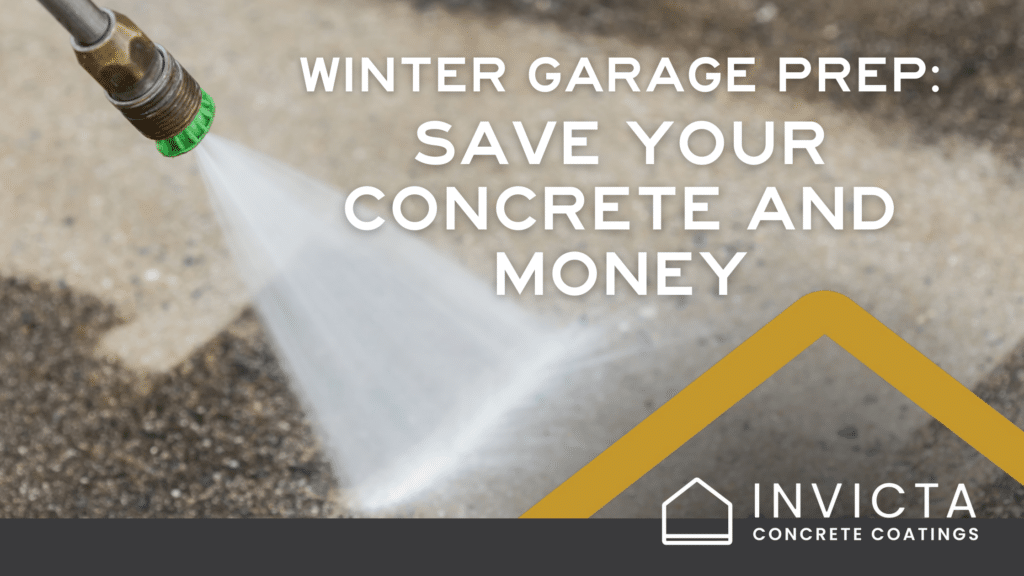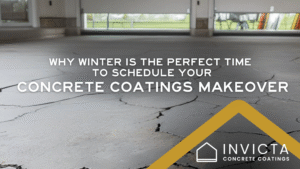As winter approaches, many homeowners start preparing their properties for the cold, harsh months ahead. One area that often gets overlooked is the winter garage prep. Homeowners may assume concrete isn’t subject to environmental stressors, but although it’s extremely durable, it can still be damaged by harsh winter weather. With the right preparation and a new polyurea coating, you can protect your garage floor against salt, snow, and the freeze-thaw cycle.
How Winter Can Damage Garage Floors
Winter weather may not directly affect your garage floor, but when you drive your vehicle into it, you bring along road salt, snow, and ice, all of which can damage your concrete floor.
Road salt is essential to keeping streets safe but can be corrosive to concrete. When the salty snow mixture melts on your garage floor, it seeps into the porous surface of the concrete. Over time, this salt water will etch the surface and can cause the concrete to crack, spall, and deteriorate, leading to costly repairs.
The freeze-thaw cycle is another significant problem for your winter garage. Water from melting snow or ice can seep into small cracks and crevices in your garage floor. As temperatures drop, this water freezes and expands, causing the cracks to widen and the concrete to weaken. When combined with salt, it can lead to even greater damage.
Even if the snow you track in is relatively salt-free, the constant presence of moisture from snow and ice is damaging on its own. It melts and trickles into existing pits and cracks, making them worse, and provides the perfect conditions for damage during freeze-thaw cycles. Moisture can also lead to the growth of mold and mildew, creating an unhealthy environment in your garage.
How You Can Protect Your Garage Floors from Winter Damage
Sealing your concrete garage floor with a long-lasting and durable coating like polyurea is one of the best ways to protect it. It is a type of polymer that is extremely popular among homeowners for several reasons:
Fast Curing Time: Polyurea cures very quickly, so you can use your garage sooner and with minimal disruption to your routine.
Superior Durability: Polyurea offers excellent resistance to abrasions, impacts and chemicals. This makes it ideal for a high-traffic area like a garage, where the floor is subjected to constant wear and tear from vehicles, tools and chemicals.
Flexibility and Crack Resistance: Polyurea’s unique flexibility allows it to expand and contract with temperature changes, making it ideal for areas subject to winter garage damage.
UV Resistance: Polyurea is also resistant to UV rays, which means it won’t yellow or fade over time. This UV resistance is particularly beneficial if your garage has windows that allow sunlight in.
Aesthetic Appeal: In addition to its protective qualities, polyurea coatings are available in various colors and finishes, allowing you to customize the look of your garage floor.
Calling in the experts to complete your garage concrete coating ensures your polyurea finish will be beautiful, long-lasting, and durable.
When to Apply a Garage Concrete Coating
The best time to apply a garage concrete coating is late spring or early summer, but it isn’t too late to complete it in the fall. This timing ensures the concrete surface is dry and free from residual winter salts. Applying the garage concrete coating in the warmer months also improves curing times.
Winter can be brutal on garage floors, but with the proper preparation, you can protect your concrete and save money on repairs. Contact Invicta Concrete today to schedule your garage coating and protect your concrete from winter garage damage.




